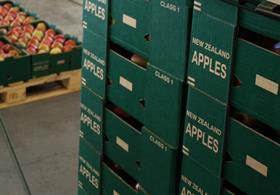
New Zealand’s export industry is cautiously celebrating this week after being informed Indonesian authorities have granted the supplier country recognition status.
The status most importantly means that New Zealand will be exempt from new Indonesian regulations restricting allowed points of entry to just four ports in the country, which went into effect yesterday.
New Zealand will now be able to ship horticultural products directly to all Indonesian ports, including the key Tanjung Priok seaport in Jakarta, avoiding the significant additions in cost the new regulations looked likely to introduce.
“`Country recognition status` is something we’ve been pursuing for some time,” Simon Hegarty of the New Zealand Horticultural Export Authority told Asiafruit.
“The countries with country recognition, and now New Zealand is one of those four, can supply products through the Jakarta seaport. Other countries must do so through the other three seaports and one airport.”
Tentative status
The New Zealand industry was informed of the new status by the country’s trade officials over the past few days, but it has yet to be officially confirmed by Indonesian authorities. The new status is believed to at the minimum apply to onions, potatoes, kiwifruit, apples, and persimmons.
“We’ve got very little detail on the actual country recognition,” Hegarty said. “We hope that within the next few days we’ll receive official confirmation in writing from Indonesia.”
The recognised country status does not appear to have any effect on regulations three and 30, however, which concern registration for importers and approval from the Indonesian Ministry of Agriculture. Implementation of the two has been deferred until September. “The other regulations are a real concern,” stated Hegarty.
Recognised countries
New Zealand now joins Australia, Canada and the US on the list of recognised countries. Indonesian authorities announced on Friday countries on the list would be able to ship horticultural products through any Indonesian ports, skirting the new regulation put in place by the country’s Ministry of Trade.
The country recognition status effectively recognises the quality of supplying nations’ phytosanitary processes, and removes the requirement for chemical residue inspection at the point of arrival.
Insufficient capacity to conduct those inspections at the four removed entry ports was given as the official reason for the new regulation, but removing the requirement for those inspections at the point of entry has undercut the rationale to keep approved countries from shipping to those ports.
“`It means` they will take our assurances on the phytosanitary status of New Zealand products,” explained Hegarty. “They’ll still need to be inspected, I understand, but to a degree that should be less than countries without recognition status.
“We believe we should be entitled to `that recognition` given we invest a lot into our phytosanitary systems here. We export to more than 100 countries across the globe, and we’ve got a good record in that area to back it up. It’s always satisfying when you get recognition for that system, because it’s a considerable cost to our industry.”



